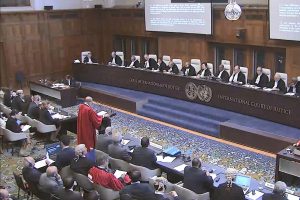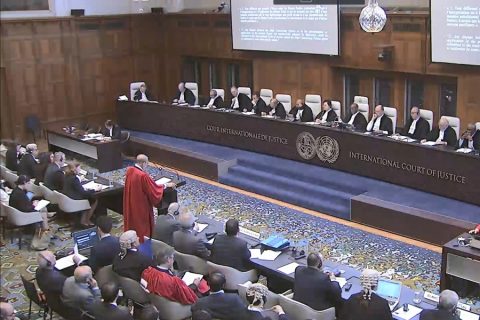 On the third day of the court hearing for Iran’s complaint about US sanctions in International Court of Justice in the Hague, the Iranian lawyers insisted Washington has no justifications for its claims.
On the third day of the court hearing for Iran’s complaint about US sanctions in International Court of Justice in the Hague, the Iranian lawyers insisted Washington has no justifications for its claims.
At the third oral hearing, Professor Allen Pall, a French lawyer of the Iranian delegation emphasized the destructive intentions of the US statesmen against the Iranian economy and people and explained the legal bases of Iran’s complaint and the refusal of the US delegation to cite the 1955 Treaty of Amity.
Rejecting the US justifications for anti-Iranian sanctions as unacceptable citing some of the provisions of the treaty and similar records in other countries, he emphasized that, because of the dispute between the parties through unresolved diplomacy, the complaint has been referred to the International Court of Justice.
He said the US justification for imposing sanctions under pretext of protecting its national security has no legal basis, referring to past conflicts and stressed that the military and paramilitary forces were the only source of threat to national security.
He said that the case does not justify the resumption of sanctions to protect US national security.
Iran’s lawyer, referring to former US president Barak Obama who said the Iran Deal was in the interest of US national security, reminded the IAEA reports that verified Iran’s commitment to its obligations 12 times.
IJC History:
The creation of the Court represented the culmination of a long process of developing methods for the pacific settlement of international disputes, the origins of which can be traced back to classical times.
Article 33 of the United Nations Charter lists the following methods for the pacific settlement of disputes between States: negotiation, enquiry, mediation, conciliation, arbitration, judicial settlement, and resort to regional agencies or arrangements, to which should also be added good offices. Some of these methods involve the services of third parties. For example, mediation places the parties to a dispute in a position in which they can themselves resolve their dispute thanks to the intervention of a third party. Arbitration goes further, in the sense that the dispute is submitted to the decision or award of an impartial third party, so that a binding settlement can be achieved. The same is true of judicial settlement (the method applied by the International Court of Justice), except that a court is subject to stricter rules than an arbitral tribunal, particularly in procedural matters.
Historically, mediation and arbitration preceded judicial settlement. The former was known in ancient India and the Islamic world, whilst numerous examples of the latter can be found in ancient Greece, in China, among the Arabian tribes, in maritime customary law in medieval Europe, and in Papal practice.
******************
Keeping an independent media alive with a paid subscription, in countries that impose limitations on it, will help to support the humankind’s freedom. PIMI and all PIM publications are absolutely independent. If you believe it please act by clicking “HERE“, or:













